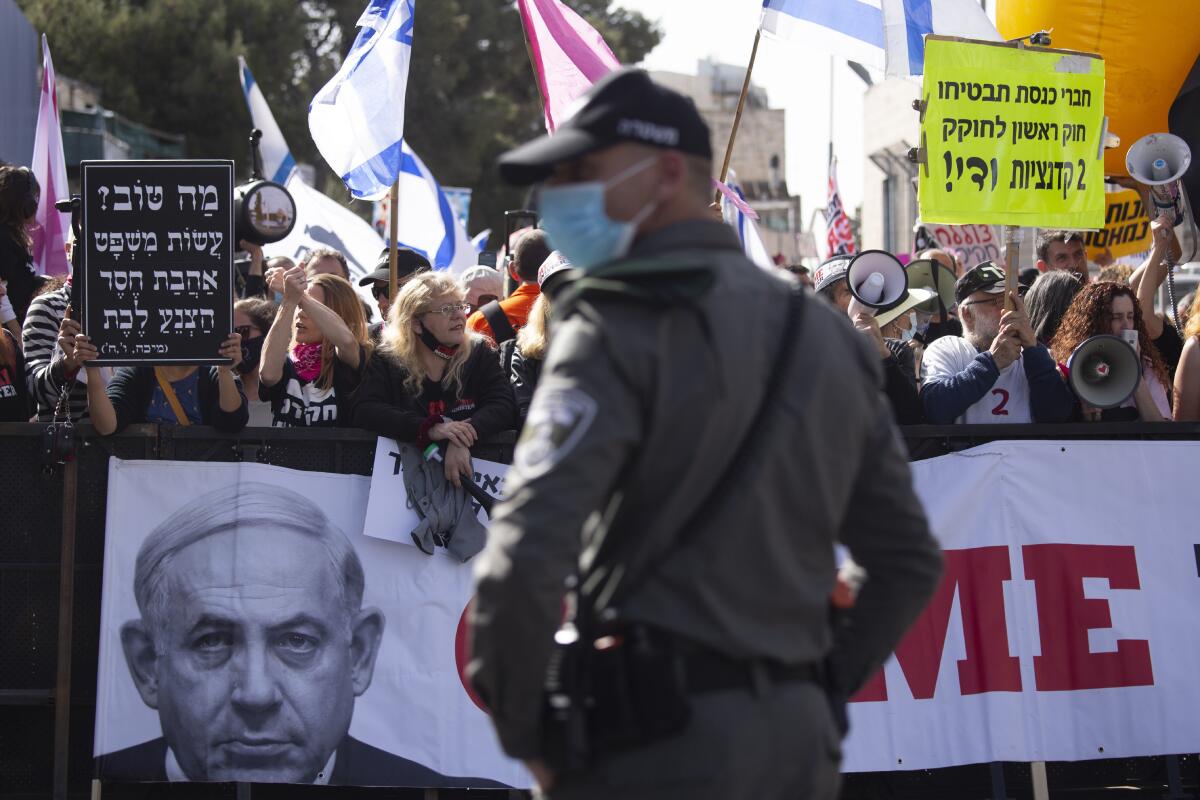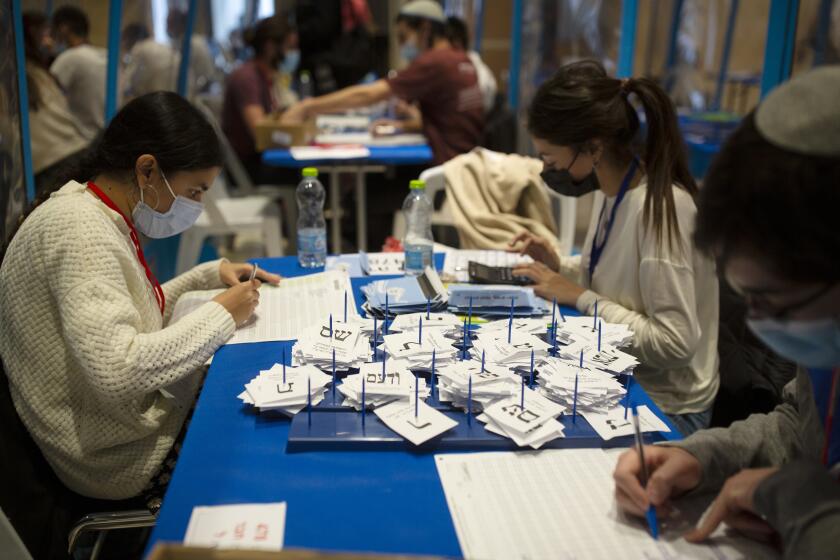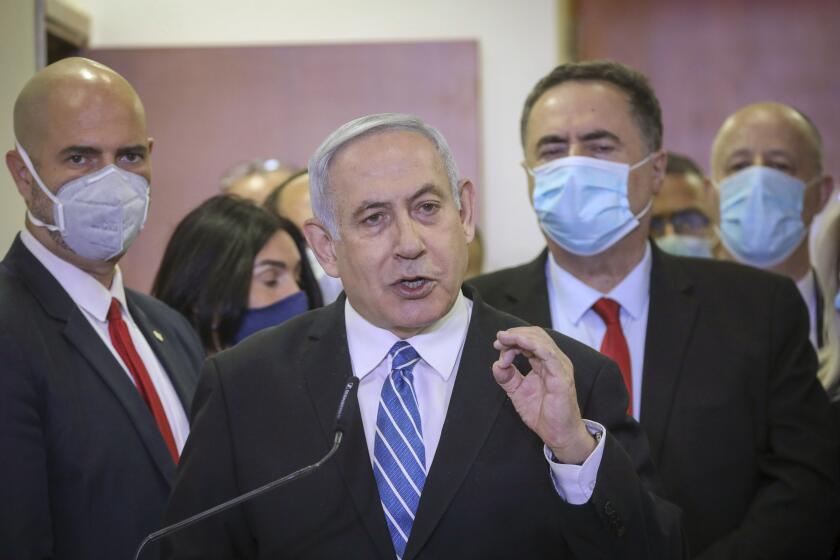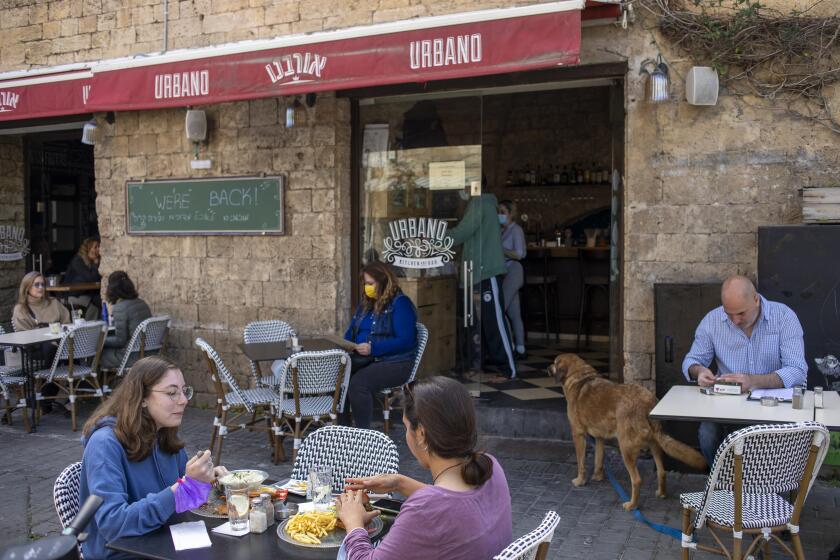Despite corruption trial, Netanyahu given first shot at forming new government

- Share via
JERUSALEM — Israel’s president Tuesday handed Prime Minister Benjamin Netanyahu the difficult task of trying to form a government from the country’s splintered parliament, giving the embattled leader a chance to prolong his lengthy term in office while on trial for corruption charges.
In his announcement, President Reuven Rivlin acknowledged that no party leader had the necessary support to form a majority coalition in the 120-seat Knesset. He also noted that many believe Netanyahu is unfit to serve in light of his legal problems.
Nonetheless, he said that there was nothing in the law preventing Netanyahu from serving as prime minister and that, after consulting with the 13 parties in the newly elected parliament, he believed Netanyahu had the best chance of any candidate of forming a new government.
“I have decided to entrust him with the task,” Rivlin said from Jerusalem.
“This is not an easy decision on a moral and ethical basis,” he added. “The state of Israel is not to be taken for granted. And I fear for my country.”
With that, Rivlin nudged forward the twin dramas over the country’s future and Netanyahu’s fate, giving Israel’s longest-serving premier a fresh chance to try to keep his career alive. Netanyahu now has up to six weeks to try to cobble together a coalition while at the same time dealing with court proceedings against him. If he fails, Rivlin could give another party leader the opportunity to try to form a government — or the country could be plunged into yet another election.
The outcome of Israel’s latest election now appears to rest in the hands of small parties, in particular an upstart Arab Islamist group.
Netanyahu holds the most support — 52 seats — in Israel’s Knesset. But that is still short of a 61-seat majority. He is likely to try to lure a number of opponents, including a number of former close aides who have vowed never to serve under him again, with generous offers of powerful government ministries or legislative committees.
The task won’t be easy.
In order to secure a majority, Netanyahu would likely need the support of a small Arab Islamist party, but one of his partners, the Religious Zionists, have an openly racist platform and say they will not serve in a government with Arab members.
“The chances of Netanyahu to form a government, as it seems right now, are quite low,” said Yohan Plesner, president of the Israel Democracy Institute, a Jerusalem think tank.
The Israeli leader, on trial for accepting gifts from wealthy friends, wants approval for a $3-million donation from an American to fund his defense.
Netanyahu will also likely need the support of the Yamina party, a right-wing group led by an ally-turned-rival. Yamina’s leader, Naftali Bennett, has had a strained relationship with Netanyahu in recent years. He has also been cool to the idea of an alliance with Arab parties.
Bennett called Tuesday for the formation of a “stable, right-wing” government and promised to negotiate in “good faith.” But he did not commit to backing Netanyahu.
Opposition leader Yair Lapid, head of the centrist Yesh Atid party, acknowledged that the law left Rivlin “no choice,” but in the same tweet denounced the development as “a shameful disgrace that tarnishes Israel.”
Lapid has offered an alternative: a power-sharing arrangement with Bennett that would see the two men rotate into the prime minister’s job. They are expected to hold intense negotiations in the coming weeks.
Start your day right
Sign up for Essential California for the L.A. Times biggest news, features and recommendations in your inbox six days a week.
You may occasionally receive promotional content from the Los Angeles Times.
In a sign of the challenge ahead of Netanyahu, about 100 protesters hoisted LGBTQ pride flags and a mock submarine — a reference to a graft scandal involving the purchase of German subs — in a noisy demonstration Tuesday that could be heard as officials began the swearing-in festivities of the new parliament in an outdoor plaza. Leaders of the Religious Zionists are openly homophobic.
Netanyahu’s coalition talks will be conducted in the shadow of his corruption trial. While a ruling is months or even years away, the court proceedings are expected to take place up to three days a week, an embarrassing and time-consuming distraction that will cast a shadow over Netanyahu’s appeals to his rivals.
Netanyahu faces fraud, breach of trust and bribery charges in three separate cases. Proceedings resumed Tuesday, though the premier was not expected to appear in court.
A key witness Monday cast Netanyahu as an image-obsessed leader who forced a prominent news site to help his family and smear his opponents.
Israel’s vaccination drive has made it able to return to much of its pre-pandemic routine. But for those who refuse shots, new issues arise.
Netanyahu denies all charges and says prosecutors are trying to undermine democracy and oust him from office.
“This is what a coup attempt looks like,” he said in a nationally televised address Monday.
The inconclusive March 23 election had revolved around whether Netanyahu was fit to continue serving as prime minister. With no party winning a governing majority of 61 seats in the Knesset, it fell on Rivlin to determine who has the best chance of cobbling together a coalition.
To put together a new government, he will have to negotiate with smaller parties that could play kingmaker, including one led by an ally-turned-rival and a new Arab Islamist grouping whose stronger-than-expected showing in the election has startled Jewish Israelis.
More to Read
Sign up for Essential California
The most important California stories and recommendations in your inbox every morning.
You may occasionally receive promotional content from the Los Angeles Times.












